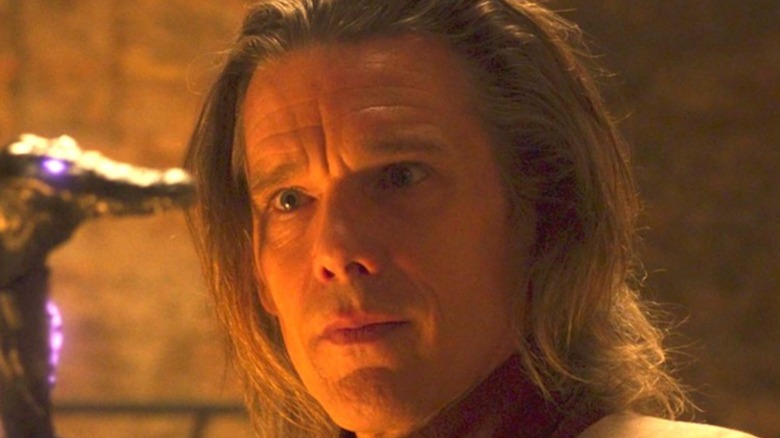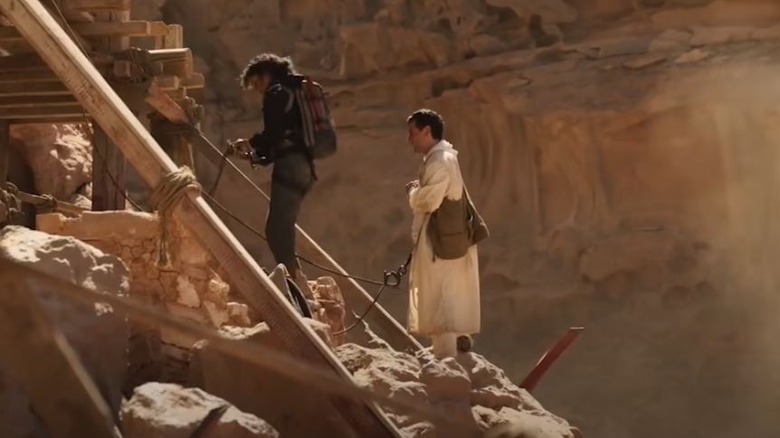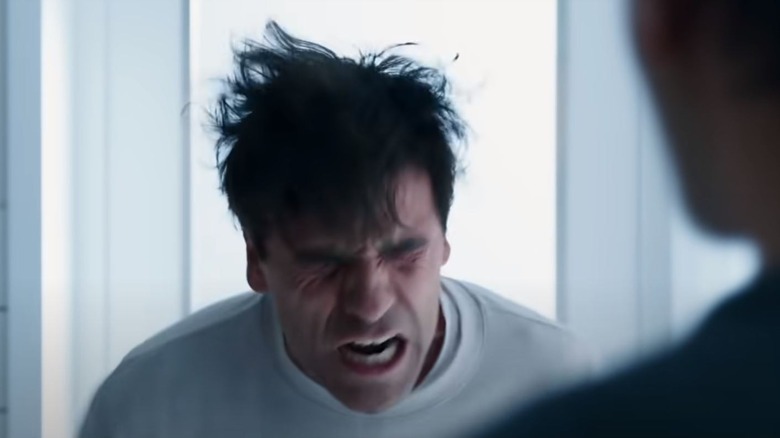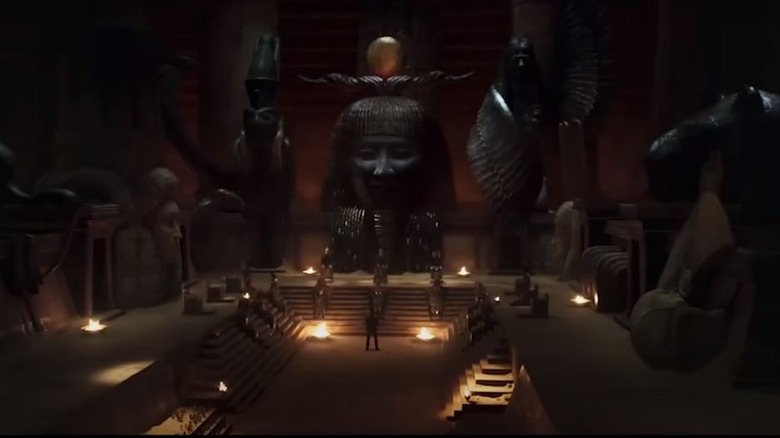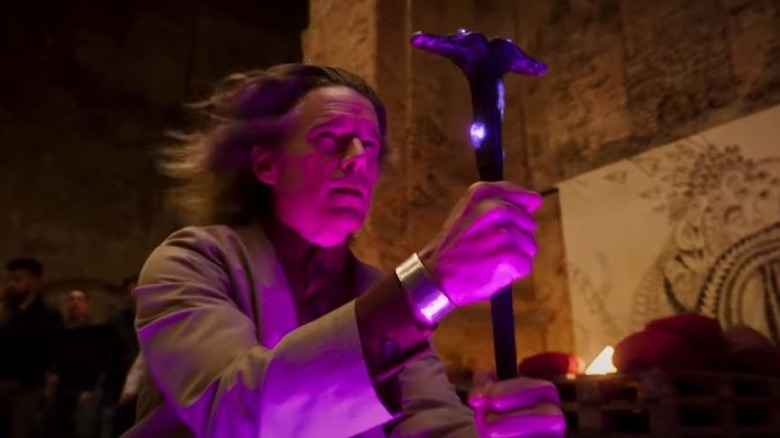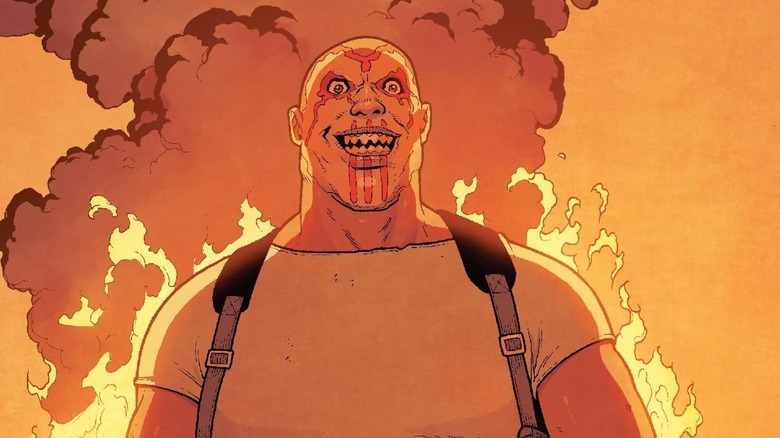The Ending Of Moon Knight Episode 4 Explained
Contains spoilers for "Moon Knight" Episode 4
Arthur Harrow (Ethan Hawke) is closing in on Ammit's tomb. Khonshu (voiced by F. Murray Abraham) has been trapped inside a novelty miniature statue, and with this imprisonment of the unruly moon deity, the other gods of Egypt seem to have put the entire situation behind them. The Moon Knight armor is unavailable after Khonshu exited stage left, and Marc Spector (Oscar Isaac) remains a divisive figure to both Layla El-Faouly (May Calamawy) and the Steven Grant personality. In other words, the end of the world as they know it seems imminent, and there's no help in sight.
It's not an ideal situation, but "Moon Knight" Episode 4 turns this predicament into a wildly entertaining 50-minute trek that starts out like a less comedic version of "The Mummy" before unleashing a cascade of horrific moments, dramatic reveals, and one extremely surprising change of scenery. As the end credits draw nearer, the situation grows wilder, and the metaphorical red question mark above the viewer's head grows until it fills the room. Don't worry, though — as peculiar as the episode is, there's a method behind all the mayhem. Let's take a moment to unpack the impressively weird ending of "Moon Knight" Episode 4.
Layla's origin story shines through
The budding love triangle between Layla, Steven and Marc reaches critical mass early in the episode, which does little to improve the fractured relationship between the protagonist's two personalities. It's a bold move to lead in with this instead of keeping the tension simmering on the background, but as it turns out, there's even more trouble on the horizon.
In many ways, a large chunk of the plot treats this as a Layla episode. She's the character who gets the most plot exposition, she successfully fights off a lethal mummy-priest creature in the biggest action beat of the episode, and even her attitude toward Harrow's mind games shows that she sees right through the villain's modus operandi. Unfortunately, Ammit's servant is able to whip out the one secret that can truly hurt Layla — the fact that Marc knows more about her father's death than he reveals.
Yet, the moment the action moves in the mental hospital, Layla appears as one of the patients. Was the badass Layla viewers knew just Marc's fantasy all along? It remains to be seen, but it would certainly be a shame to lose the intricate buildup one of the MCU's coolest new characters has received so far to a plot twist like that. After all, as interesting as Layla has been so far, her conversation with Harrow confirms her involvement in one of the most iconic Moon Knight stories: The death of her comic book counterpart's father, and the rebirth of Marc Spector. This seems like the kind of thing that the MCU wants to show the audience, so at the very least, it seems reasonable to expect a flashback scene of the incident that acts as the origin story of both Moon Knight and Layla the adventurer.
Suddenly, a mental hospital
Usually, the protagonist getting shot in the chest would be the biggest wham moment in any given show, but true to its offbeat nature, "Moon Knight" finds a way to raise the stakes in the very next scene. After Harrow shoots him in the chest, Marc wakes up in a mysterious facility that turns out to be a mental hospital. There, his friends and enemies serve as patients and orderlies, and the place is scattered with evidence that he's imagined everything that's happened in the show so far.
The scene is clearly inspired by writer Jeff Lemire and artist Greg Smallwood's "Lunatic" comic book storyline, which starts when Marc Spector finds himself locked in a strange hospital with a number of his acquaintances, and receives a whole bunch of evidence that he has been there since he was 12 — which would mean that his adventures as Moon Knight are just a figment of his tortured imagination. One of the implied antagonists of this story is none other than Ammut (the comic book's spelling of "Moon Knight" big bad Ammit), who may or may not hide behind the identity of Marc's psychiatrist, Dr. Emmet. Appropriately enough, it's Arthur Harrow who plays the part of the doctor here. While he doesn't actually sprout a crocodile head in this version of the story, he does bring his trademark brand of vaguely menacing warmth in his scene with Marc, which is arguably even creepier.
The Eye of Horus and the arrival of Taweret
So, is Marc really institutionalized, and the events of the show until this episode's final moments simply didn't happen? Unlikely, considering the many hints the show drops about the illusory nature of the mental hospital.
Early in the episode, much is made about how the Eye of Horus ward in the Tomb of Alexander represents the senses — including the sixth one, which appears to be a "mind's eye" type of deal. the "doctor" Harrow speaks at length about the fact that they "live in a psychic world," and Marc encounters several impossible things during his escape from Harrow's office. Notably, he comes across a sarcophagus that contains a physical version of the Steven personality. A little bit down the line, there's another sarcophagus, which rattles aggressively and presumably contains the third personality Episode 3 teased. Oh, and of course, there's also the minor matter of the large, hippo-headed goddess who happily greets Marc and Steven in the final shot.
The hippo lady might creep the protagonist(s) out pretty thoroughly, but at the end of the day, she might actually be the absolute best entity they can encounter in their predicament. Per Variety, the character is Taweret (Antonia Salib), a fertility goddess and a good friend of Khonshu's ally, Hathor (via Encyclopedia Britannica). Though the character's happy greeting makes her seem pretty goofy, Glencairn Museum notes that she's actually an extremely powerful protection goddess who's informally known as "The Great One." That's the exact kind of backup you'd want after being shot in the chest and finding yourself in a mystery facility, and it'll be interesting to see how Taweret's arrival plays out in "Moon Knight" Episode 5.
Harrow might not be as confident as he seems
Arthur Harrow continues to prove himself as one of the most capable MCU villains. He artfully sabotages Steven and Marc's attempt to escape with the Ammit statue by revealing Marc's old sins to Layla. When the mercenary refuses to cooperate and tries to start a cool fight scene, Harrow refuses to play along. Instead, he simply whips out a gun and shoots the hero.
Still, there are hints that things might not be what they seem behind the villain's assured, all-knowing act. Take the mental hospital scene, for instance. While Harrow continues to play up the "I understand you better than you think" angle that's been his calling card throughout the show, he also notes in no uncertain terms that he also has plenty of first-hand experience with mental health issues. Up to this point, it's been clear that Harrow is a zealot of the highest order, but he's personally seemed to consider himself the only sane man in a broken world. Does he express a deeper understanding of his own situation, here, or is it just another mind game?
Attempting to cleanse the world with the power of pre-emptive murder is not what you'd call a healthy activity, and when you connect the dots, Harrow has dropped hints about his inner turmoil before. In "Moon Knight" Episode 4, he explains that his Ammut-related scale powers work by subjecting him to specific sinful and painful moments of a subject's past, which doesn't seem too great for one's mental health, especially since Harrow seems to do it on pretty much daily basis. He's also alluded to the fact that he's suffered greatly while serving Khonshu, and outright states in Episode 3 that his hand is forced. Is a villainous breakdown imminent?
The episode might confirm a major future antagonist
At this stage of "Moon Knight," Harrow is clearly winning, but the show's already started teasing future challenges for Moon Knight in the event of the current antagonist's defeat. The previous episodes have been throwing hints, but "Moon Knight" Episode 4 drops the bomb: Raoul Bushman is out there. Oh, they don't actually mention him by name, but when Layla confronts Marc about her father's death just before the episode's endgame, the former mercenary describes his murderous squad leader in a way that can't possibly refer to anyone else.
Layla is the MCU version of Marlene Alraune, whose father was indeed murdered in the comics by Bushman, in the exact way Harrow describes. This is a big thing, because while Moon Knight has many antagonists in the show, Bushman is intimately connected to his origin story, and goes on to become a recurring Moon Knight nemesis who causes the hero endless amounts of grief. He's an imposing and interesting character, and while it's unclear whether his eventual appearance will be as a full-on antagonist or a quick flashback cameo, it seems unlikely that the show would just drop such an obvious reference to the iconic Moon Knight villain and then completely ignore him.
